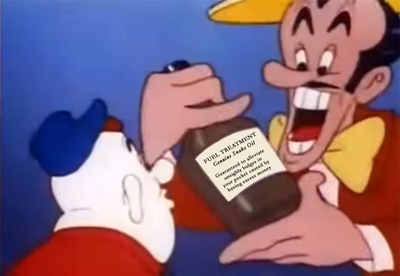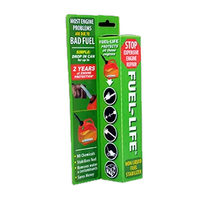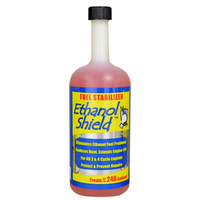Automotive Aftermarket Saturated with Snake Oil Engine Additives
 |
Open Letter to B3C Fuel Solutions, LLC, (manufacturer of FUEL LIFE In-Tank Fuel Stabilizing Filter and ETHANOL SHIELD FUEL STABILIZER)
 Marc Rauch |
By Marc J. Rauch
Exec. Vice President/Co-Publisher
THE AUTO CHANNEL
(Note: This is also an open letter to all manufacturers of snake oil engine additives)
TO: Jeremy Barrow
B3C Regulatory Compliance
B3C FUEL SOLUTIONS, LLC Conway, SC
Hi Jeremy -
Thank you for your reply to my email of August 6th. Sorry it's taken me a week to respond but I was working on a couple of other editorials. You may be interested in them because they have some bearing on the issues I asked you about. The first is titled "Dr. J Fouls Out on Ethanol Fuel" and you can read it at https://www.theautochannel.com/news/2019/08/06/675683-dr-j-fouls-out-ethanol-shots.html.
The second is titled "Famous Manufacturer of Anti-Ethanol Additives Proves Ethanol's Safety and Benefits" and it can be found at https://www.theautochannel.com/news/2019/08/10/677743-is-it-is-or-is-it-ain-t-famous-manufacturer.html.
The commonality between these two editorials are the claims that ethanol fuel is harmful to engines, fuel systems, our environment, and living creatures (humans). But these claims are patently absurd. The notion that ethanol is as hazardous or more hazardous than petroleum oil-based fuels and petroleum distillates is laughingly ridiculous. Ethanol can be safely consumed by humans, and exposure to the skin is not harmful - it is usually beneficial. Ethanol fuel can be as hazardous as gasoline when gasoline or some other poison is added to the ethanol to render it non-drinkable. However, if tax collectors and society wasn't so concerned about having a substance that could power an internal combustion engine and "power" a margarita at the same time, then a poison like gasoline wouldn't need to be added to ethanol when it is used as an engine fuel.
The second editorial mentioned above is more relative to the products produced by your company. The claims made by your company are, in my opinion, every bit as scurrilous as those made by GOLD EAGLE; and this is why I contacted you after reviewing some of the claims found on your company's website.
One of the first claims I came across on your company's website that caught my attention was the statement:
"Gasoline and milk are both organic — they decompose the same way." (https://b3cfuel.com/resources/faq/#toggle-id-24)
In my initial email to your company I asked "How is gasoline organic?" Your response to me was "Gasoline is not organic as in organic food. It is organic chemistry."
To me, this was a wonderful reply. Not wonderful from the perspective that it provides any worthwhile explanation; wonderful because it shows the extent that your company (and others who sell similar products) will go to try and falsely ennoble a poison like gasoline compared to a life-giving, life-sustaining substance like milk. Someone might argue that it's simply oxymoronic semantic word play. I say it's simply moronic. Gasoline is a poison. It's refined from poison into another poison, and then regardless of whether it's fresh or "spoiled," it remains poison. Milk does indeed sour, but when it does it can then be used to make cheese, which some people think tastes even better than milk.
In my initial email to your company I asked about other claims on your website. I wrote:
"You say that ethanol damages rubber, plastics, and metals. Specifically which types of rubbers, plastics, and metals does ethanol damage that gasoline and aromatics doesn't? You say that ethanol is corrosive by nature and hygroscopic (attracts water), particularly when higher amounts of water are present. All liquids are corrosive, but alcohol is also a natural preservative. Do you think gasoline and diesel fuel are natural preservers? And when you say that ethanol attracts water particularly when higher amounts of water are present, do you mean that ethanol can continue attracting endless quantities of water? And how exactly does ethanol "attract" the water?
"One more thing, since ethanol evaporates cleanly, and burns cleanly, how does ethanol cause the varnishing effect that you refer to? And how is this varnishing effect different than the varnishing effect that was caused by gasoline in all the decades of gasoline use when ethanol was not commonly blended with gasoline?"
You didn't answer these questions. Instead, you wrote:
"As for the rest of your questions, please read the following document that is available via our resource documents on the website: https://b3cfuel.com/wp-content/uploads/2019/07/B3C-Fuel-Life-White-Paper-EDoc-7.24.19.pdf."
When I first reviewed your website I thought to myself that you guys didn't know what you're talking about. I was extremely happy to receive this "white paper" report from you - it's really quite wonderful...in the same way that your reply about the organic nature of gasoline was wonderful. The white paper proves that you guys don't know what you're talking about (or that you've intentionally exaggerated and misconstrued information about engines and fuels to malign ethanol).
Your white paper makes lots of errors, false insinuations, and offers misleading descriptions of technical scenarios. Some of the denigrating statements are "local" to a specific point being addressed in the report, and some are overarching to cover the entire document. For example, your white paper starts with a synopsis that is total nonsense. The synopsis reads:
"Fuel is Changing. Today’s modern gasoline is constantly changing, but not in a positive way as it relates to small engines. Ethanol content is rising. Fuel has inherent contamination, including water bonded to ethanol and particulate matter and is not delivered “safe” for engines and fuel injectors. The water problem becomes worse over time with condensation and water encroachment and we know that WATER is the greatest enemy to your fuel system and engine. We know that ethanol attracts water and at some point this corrosive mixture phase separates to the bottom of your tank. Tier 3 standards that reduce sulfur content will drive up peroxides and gums. As these issues compound, fuel will tend to degrade in as little as 60 days (or much less) before it is considered no longer acceptable to use. Consider marine equipment in which the fuel can sit for long periods of time before it is needed. This same contaminated fuel is what enters the engine, causing problems that lead to costly repairs and downtime."
In fact, any changes in "today's modern gasoline" is consistent with the many, many changes that fuels have gone through over the years. The intervals of change are not radically different than the past. It might even be accurate to say that with tetraethyl lead (TEL) and MTBE out of the picture that this is the most honest and stable fuel period ever.
Moreover, any changes that have occurred within the past generation are very definitely positive improvements...unless you work in the petroleum oil industry and you're a fan of deadly ingredients.
The history of fuels and engines is an ever-changing tableau. Fuels have evolved - sometimes devolved - for well over 100 years. Gasoline has gone through increases of octane levels from about 50 to levels around 90, with racing gasolines going over 100 octane. Anti-knock, detergent, and various anti-corrosive ingredients have changed over these years, as have the changes in other ingredients related to competitive branding, availability of substances, geography, seasonality, and legal requirements. At any given time, gasoline could contain from 150 to 1,000 different chemicals.
The addition of ethanol has had an extremely positive effect. If there's a downside, it's that the transition from very low ethanol levels to higher ethanol levels has been taking too long, particularly in light of the terrific success attained by higher levels of ethanol content outside of the United States and the domestic testing that has proven levels around E30 to be the best fuel for standard "gasoline-powered" internal combustion engine automobiles. Funnily enough, the inclusion of ethanol into gasoline blends is actually a return to earlier days when all the best automobile and engine people knew that ethanol was a better and safer fuel than gasoline, and that using ethanol as an anti-knock and cleaning additive was superior to any other remedy.
The issue of water in an engine's fuel system has not worsened over time. It is the same problem it always was. The natural condensation process hasn't changed; condensation doesn't occur at a quicker pace today; the chemistry of water hasn't gone through any changes that exacerbate the corrosiveness of water. There is no sudden increasing encroachment of water simply because the Boston Red Sox and SF Giants have won some World Series championships in recent years.
When and if phase separation occurs, it occurs because of gasoline's inability to absorb and hold very much water (gasoline is also a hygroscopic substance, although a poor one). This hasn't changed, and ethanol doesn't make the problem worse. Ethanol alleviates the problem.
Condensation occurs regardless of the presence of ethanol. Condensation occurs naturally without the presence of any other liquid. Condensation also readily occurs when only ethanol-free gasoline is present. Phase separation will occur when only E0 is present, and it will occurs about 26 times quicker if there is no ethanol in the fuel tank.
The primary way to remove the water from a fuel system has been by adding something to "absorb" the water and expel/vaporize the water in the combustion process. The best, safest, cleanest, healthiest, and least expensive way to do this is by adding ethanol to the gasoline. Ethanol remains the best, safest, cleanest, healthiest, and least expensive way to remove water from the fuel system. Ethanol is a hero; gasoline is the villain.
 |
If gasoline is inherently dirty and contaminated, it's because gasoline is garbage; it is among the lowest of the refined products made from crude oil; it comes out of the ground not out of sterilized metal tanks. The build up of carbon debris that results in the gum/gunk/goo/crud/varnish that blocks valves, fuel injectors, carburetors, fuel filters, hoses, and connectors is caused by gasoline. Ethanol is a safe and effective solvent that removes the gum/gunk/goo/crud/varnish that may have built up, and it protects against this junk from forming.
 |
What's more, these petroleum distillates are all more corrosive than ethanol to rubbers, plastics, and metals used in engines. They don't offer protection, they offer destruction. You want to use crap produced from petroleum poison to clean the junk that forms from burning fuel made from the same poison. It's insane.
 |
Your white paper talks about how gasoline-powered equipment has experienced increasing problems since the use (in America) of ethanol-gasoline blends. But you know what has really increased during that same time period? Gasoline-powered equipment has increased, dramatically. Regardless of how much ethanol is in a gallon of ethanol-gasoline fuel, a push reel lawn mower is completely resistant to the corrosive effects of ethanol and gasoline. In the entire history of push reel lawn movers and manual clippers not one has ever been subject to phase separation or hygroscopic related water corrosion or carbon debris build-up...isn't that incredible?
Not only have sales of ICE powered equipment risen year after year over the past two or three decades, the accumulative number of these units has increased multiple times. Suggesting that any increase in the number of repairs needed is due to ethanol is preposterous. The increase in the number of repairs is due to the burgeoning amount of old and new power equipment that's in use. This equipment was never designed to last forever, nor even longer than just a few years. Fear mongering is a powerful marketing tool, and this is the tool that you are using. Erroneous blame being placed on ethanol from under-educated engine mechanics is helped by the rampant spread of malicious lies from the petroleum oil industry and companies like yours.
For six decades, ethanol-gasoline blends were sold in Great Britain as "power-alcohol." It was sold by the biggest oil/gasoline companies, and it was marketed as being superior in every way to gasoline without ethanol. It was marketed for use in cars and trucks of all types, boats, and propeller-driven airplanes. If there were problems from ethanol such as the problems you claim there would be reams of literature lambasting ethanol, but there isn't.1
Since 1978, Brazil has mandated the use of E15 or higher blends. All vehicles and power equipment sold in Brazil are the same as the vehicles and equipment sold in North America, Europe, and Asia. If ethanol was the villain you claim there would be reams of literature attacking ethanol, but there isn't.1
Your white paper then reiterates the lies and misinformation:
"Finally, let’s consider the phase separated ethanol/water mixture that ended up in the bottom of your tank. It is extremely corrosive. Problems to power equipment include, but are not limited to, severe corrosion, carbon/varnish/gum, and dried/brittle rubber and plastic parts."
If a fuel tank has a phase separated layer of contaminated ethanol/water on the bottom, the equipment owner should be lucky that there was ethanol in the tank, other wise the phase separation and corrosion could have occurred about 26 times earlier. And if ethanol wasn't mixed with the gasoline, and it instead had something like the petroleum distillates contained in your ETHANOL SHIELD liquid, it would be extra contaminated from petroleum distillates.
If you have products that truly provide some benefits, prove it. Reveal the identity of the mysterious petroleum distillates you use. If you can't or won't then knock off the lies, exaggerations, and false explanations.
Don't concoct paranoid scenarios based upon incredulous definitions and impossible circumstances. Ethanol does not attract water.2 Ethanol mixes with, and absorbs water that it comes in contact with. This is a good thing, not a bad thing.
As I wrote near the end of my GOLD EAGLE products review, "The reason that additive companies are against ethanol-gasoline blends is that putting ethanol into gasoline makes their aftermarket products redundant."
I'd be happy to study any reply you care to make and I'll append your reply to this open letter for public viewing. And if you can prove your claims are correct I'll apologize.
2 Ethanol Does NOT Suck Water Out Of The Air
• SEE ALSO: Famous Manufacturer of Anti-Ethanol Additives Proves Ethanol's Safety and Benefits


